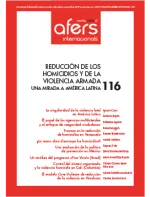What does the failure to reduce homicides in Venezuela teach?

This article addresses the paradox of increased homicides in Venezuela in a period of wealth and redistribution. To do so, theories that explain criminality through poverty and inequality are reviewed and refuted and weighed against theories of institutionalism. Thus, the article analyses the situation of homicides between 1985 and 2010 and establishes three periods in which the rules regulating access to a) goods, b) political power, and c) social and penal control were broken. The theories are discussed with statistical information and interpreted within the economic and political context of the time. It is concluded that the reduction in homicides requires institutionalism based on sensitivity and certain formal and informal rules that allow the construction of legitimacy around social difference and punishment, and a citizens’ culture that favours social control by peers over penal control by the State.
Key words: homicides, violence, poverty, institutionalism, Venezuela
DOI: doi.org/10.24241/rcai.2017.116.2.53
>> The full text articles of this issue are available only in Spanish language